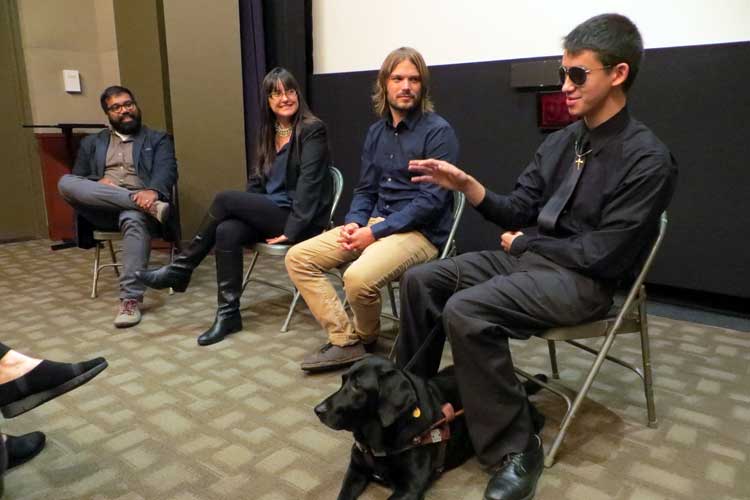The following questions and answers are excerpted from a conversation that followed the NBR screening of Keep on Keepin’ On.
Mr. Kauflin, what was your reaction when you were approached about being in this film?
Kauflin: When Al asked me that, we had already known each other for a few years; he was a good buddy of mine. I knew he was a great drummer, and apparently he’s a good surfer as well. And I said, ‘sure, you can follow me around with a camera,’ because I figured nobody would see it! But it really took on a life of its own when we started filming. Because I really thought he wouldn’t have much to film—it was just me and my very cute dog living in New York, without much going on. So, I just thought, ‘good luck finding a story,’ but then things just started happening and he was there to capture it.
I thought of the film like a series of songs.
Ms. DuPré Pesmen, you have a background in producing big narrative feature films and high-profile documentaries. How did you come to be involved in this film?
DuPré Pesmen: It’s not your typical way that I’ve gotten involved in projects in the past… Al probably tells this story better?
Hicks: We had been shooting for two and a half years, and we sort of hit a roadblock. So we started asking questions: “What do we do?” And a friend of mine said, you know, you really need a producer.
DP: So he sold his surfboard and bought a ticket to Sundance, where I was premiering Chasing Ice, and he got into our premier somehow—which was amazing, since I couldn’t even get my own family in! But I’m so glad Al got in. And he started calling, saying he had this project… and we were in the middle of trying to sell Chasing Ice at the time, it was very intense, and I kept getting these very nice voice mails asking to meet, and I kept thinking, ‘not today!’ But his messages were so nice, and he kept up just about the right amount of persistence, so I finally met with him to watch some footage. Then I just fell in love with the characters and the music. And after talking it over with Al it was clear we both saw the film in the same way. And it became one of those projects you just have to do.
What gave you the confidence that you could tell this story, as a first-time director?
AH: Well, I studied music, which was a great influence on how I approached the film. There’s a lot of repetition in filmmaking, and you have to stay upbeat, just like when you’re making music. And I also conceived of each scene as a song, with a beginning, middle, and end, and just kept that going throughout the entire movie. Luckily the editor was willing to do that with me, since it’s a pretty abstract way to look at things! But it really helped, because it created structure and pacing, and for the whole film I thought of it like a series of songs that we were shaping into an album. And that helped me just generally understand how to piece it together.
Mr. Kauflin, obviously Clark Terry taught you a great deal. In the film, it’s interesting to see how he gets strength from you at times. Can you talk about the reciprocal nature of your relationship?
JK: I think the special thing about Clark – and I think this is how he is with all of his students – is that he is a teacher, but he’s also so humble. He says that when you’re teaching, you’re also learning. And that makes it so much more special for each of his students, to be able to share with him and to realize he’s being receptive and getting something out of the relationship as well.

